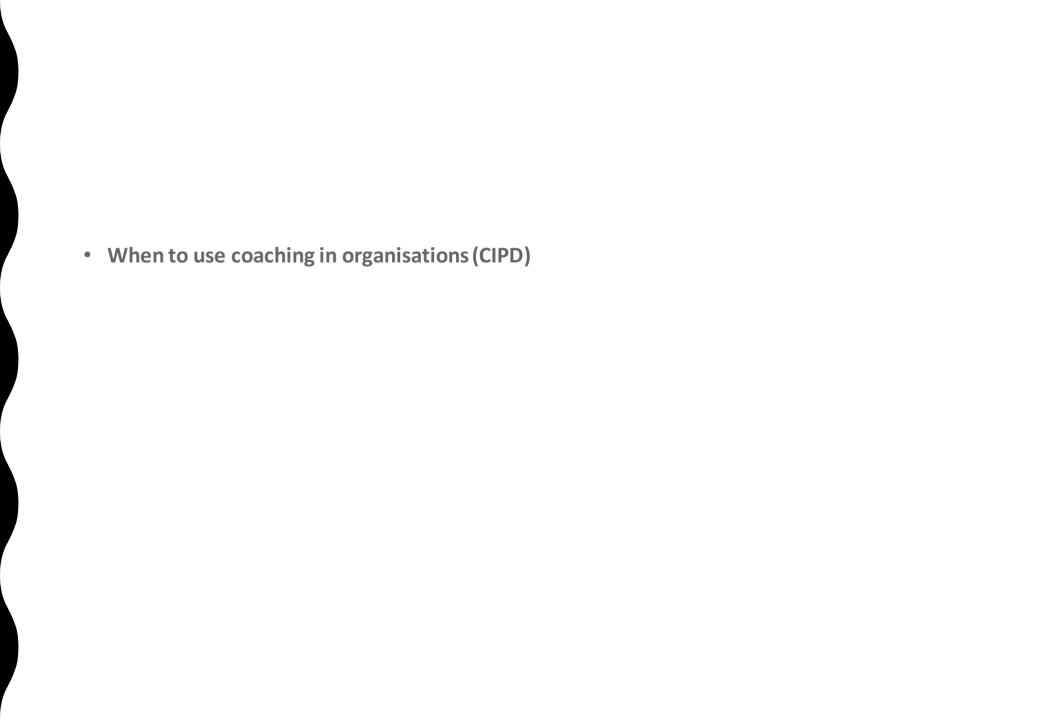
5 minute read
COACH’S DUTY OF CARE
Coaches and mentors have a duty of care towards:
•The coachee.
Advertisement
•Themselves (it’s hard to help someone else, if you are not looking after your own mental and physical well-being!).
•The profession (for professional coaches and mentors).
•Key stakeholders, including the coachee’s family, and the employer organisation.
•Part of the duty of care is to avoid doing harm, which we can define with respect to the coachee as ‘anything that might be detrimental to the coachee’s physical or mental well-beingor might bring about negative consequences (career, financial, etc.) for them’.
•The same principle applies generally to the coachee’s organisation.
The duty of care towards the coachee involves two main aspects:
•1 Protection (preventing, where possible and appropriate) the coachee from harming themselves.
•2 Coach behaviour, including:– Knowing enough of the coachee’s circumstances and environment to recognise potential sources of harm.
•Avoiding unethical collusion with the coachee or others.
•Avoiding inappropriate relationships.
•Recognising and avoiding the coach’s own agenda.
•Breaching boundaries between coaching and therapy.
• In an organisational context, while mentoring takes place largely outside the hierarchical structures, the duty of care for a line manager coach is partially balanced by the requirement to deal equitably with all direct reports and by their own responsibilities towards the organisation. This may bring about a conflict of interest between what is good for the coachee and the good of the organisation.
• To manage this conflict, the line manager can:
• Recognise and be open about the issue, exploring with the coachee both the context and what fair looks like.
• Offer support (from themselves and others) in helping the coachee determine their own best strategy.
• Be honest with themselves about their own motivations and agenda.
• If the line manager coach has any concerns about how to exercise their duty of care, they should consult their coaching supervisor.
• Assessment Criteria 1.4
• Develop a case that coaching and mentoring can benefit organisationalstrategic performance objectives through individual, team and departmental performance development
• It may be useful to outline some of the benefits of coachingand mentoring in supporting performance improvement/developmentand the achievement of objectives for individuals, teams and departments. Learners, where possible, should integrate the characteristics of their own organisation into this narrative in order to demonstratethe potential for coaching and mentoring to drive organisational performance and development in context.
• Areas that may be of relevanceto consider here include (but are not confined to) the following:
• Coaching and mentoring acts as an enabler at the individual level to create a sustained development opportunity for that individual.
• The potential value of this would be that the individual’s development could be more rounded, contextualised, personalised and, potentially better assimilated resulting in enhanced performance and development overall
• Coaching and mentoring promotes communications, developmental, and cultural impacts resulting from collaboration, relationship building, trust, respect, support, formalising informal networks, disseminating good practice, connectivity etc.
• Coaching and mentoring allows more staff to become involved in leadership and organisational development (distributed leadership, distributed learning opportunities)
• Coaching and mentoring leverages experience and knowledge; sharing personal and professional growth and development (both ways: mentor/coach and mentee/coachee).
• Assists organisations when preparing for succession.
• Establishing the key principles of coaching i.e. awareness and responsibility, supports opportunities for effectivechange management, individual, group and organisational development
• Principles of Coaching
• Different principles of coaching are:
• • Coach the individual
• • Identify and understand the several ways of coaching
• • Do not put tick marks imprecisely
• • Encourage self-discoveries of the individual
• • Identify the reasons for providing coaching
• • Should be alert and concentrated
• • Provide necessary guidance's and directions
• • Through coaching change the perspectives of individual
• • The coach has to use positive signs and languages during coaching
• • The coaching process should be flexible and simple
• Coaching is actually an art which is done by helping a person to overcome all his problems and to build his confidence level. The main three points of coachingare
• Awareness- Awareness about the topic or about session which is coaching is going to be held on is important. It is an important way of establishing an individual into a new different person which all changed attitude. The potential of that person should be improved by mentoring session and the concerned person should feel it.The main aim of providing coaching and mentoring in any basis, is simply to boost the personality level and to give an ability to accomplish all the wishes they have.
• Responsibility Coaching and mentoring is a responsibility towards the person which comes to get mentored and it is the responsibility of the coach to help them to attain all those heights. Also they have to be precise in delivering them with all due respect to the person. The other responsibilities included are the planning, organising and establishing the planned outcomes or events and the mentors should not be partial among the peer while giving the session and also should not be too much loud.
• Support is something given by the mentors to the people who lack the confidenceto show themselves in a group or public. By building authentic connection between people in that peer may increase the connection and can feel free mentally. Recognising the strengths as a mentor would help them to be more comfortable and enhance their skills.
• Benefits of Coaching
• Career growth can be increased with skill level, problem analysis and unique way of thinking.
• Employees will be able to increase their level of thinking and perspectives about each concept may change due to proper guidance.
• It reduces the disappointment and the lower selfesteem and also helps in building more relations.
• The eagerness to achieve the target and goals will be heightened and the workplace will be improved in a whole.
• The retention rate will be increased and the organisation can be drawn to achieve success. MacLennan (2017)
• Coaching and mentoring in Organisations
• An organisation consists of employees with different confidence level and different potential; this may result in uneven growth of the organisation.
• So to maintain this, mentoring is implemented as regular practice in every other organisation.
• There are certain set of standards and methods to involve in a mentoring session and it may differ according to the style of the company.
• While speaking about the whole growth of organisations, human resources are utilised at its maximum.
• Company culture and ethics get improves also the standard and turnover of the organisation isalso increased.
• Organisationalbenefits of coaching
• Coaching or mentoring gains more improved work process and tensionless work atmosphere, moreover, the communication between the employees and authorities is also increased. Denmark and Podsen (2013)
• There are many other benefits for providing coaching and mentoring to the staff, they are namely, Significance, Retention, Personal development, Team efficiency . Connor and Pokora (2012)
Significance
• To get a good start in an organisation forthe new joiners, through coaching and mentoring it helps them to adapt the environment and can easily handle the situation very smoothly.
• Also it helps to know the rules, regulation, responsibilities, and processes from the senior employees without any hesitation.
• Coaching and mentoring can be used as a guide to career path, personal guidance etc.
Retention
• The major problem faced by the major organisations is the employee turnover, because the organisations couldn’t meet the needs of the employees.
• Coaching provides employee loyalty and the intention to stay back in the company.
• It also helps the employee to feel comfortable in and around the management which encourages an open talk between the employees.
• Employees can hold themselves in the same company as much as they want due to the improved situations in the management. Connor and Pokora (2012)







